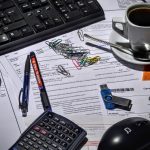Today, I’m tackling the complex issue of claiming VAT and how this interacts with the option to tax for speculative property developers. If you understand how the main principles work, this will help you to understand that claiming VAT on costs isn’t simply a case of opting to tax AND that opting to tax isn’t always the only or best solution.
The subject of the option to tax and claiming VAT on property costs go hand in hand for most speculative property developers. A large proportion of the queries I receive from property developers – whether doing commercial or residential development – are about whether the developer can claim VAT on the purchase of a property or other costs, particularly their legal bills. The common approach is usually to opt to tax the land or buildings in question so that VAT can be claimed under the normal VAT recovery rules.
But opting to tax isn’t always the best approach. In fact it can actually cause problems particularly if any prospective buyer wants to buy the property for exempt business use, such as short term residential letting. Plus opting to tax also increases the stamp duty land tax cost because SDLT is payable on the total consideration paid, including VAT.
Of course, in some cases there’s no alternative, particularly if you’re buying a property rental business and the vendor has opted to tax the property or you need to claim the VAT on unoccupied land or buildings for cashflow purposes. But ideally, you want to keep your options open and only opt to tax if absolutely necessary.
VAT recovery: back to basics
That’s why you need to understand a bit more about the VAT recovery rules. It isn’t just about the direct attribution of input tax to taxable or exempt supplies. Claiming VAT is actually based on a whole system of rules, called partial exemption. And as I’ll explain below, opting to tax isn’t the only way that property buyers can claim VAT on their costs.
The main principle of VAT recovery is that you can claim VAT on goods and services used to make taxable supplies. You can’t claim VAT on goods and services used to make exempt supplies (“exempt input tax”), except in certain limited circumstances, including if this VAT falls within certain de minimis limits of £7,500 per VAT year and 50% of all input tax incurred in that year.
When do you become partly exempt?
You become partly exempt if you’re a VAT registered business and make or INTEND TO MAKE any exempt supplies and you incur any costs that relate to those exempt supplies. And we’re not just talking about VAT on directly attributable costs, but also overhead costs such as the telephone bill or your accountant’s fee. Also, remember that partial exemption isn’t simply a quarterly adjustment, it covers the twelve month “VAT year”, with annual adjustments.
Speculative property costs and residual input tax
 The normal rule for ANY expenditure is that if you don’t know whether the goods will be used to make taxable or exempt supplies, the VAT on those costs is “residual input tax”, which is allocated between taxable and exempt supplies using a “partial exemption method”. The normal method is to apportion this VAT in the same ratio as your taxable supplies bears to your exempt supplies. If the developer doesn’t know whether the property will be used to make taxable or exempt supplies, then the VAT on the related costs (including VAT on the property itself) is “residual input tax”.
The normal rule for ANY expenditure is that if you don’t know whether the goods will be used to make taxable or exempt supplies, the VAT on those costs is “residual input tax”, which is allocated between taxable and exempt supplies using a “partial exemption method”. The normal method is to apportion this VAT in the same ratio as your taxable supplies bears to your exempt supplies. If the developer doesn’t know whether the property will be used to make taxable or exempt supplies, then the VAT on the related costs (including VAT on the property itself) is “residual input tax”.
So where does that leave speculative developers?
The simple approach is to opt to tax any property so that you can claim all of your input tax. But that doesn’t always make sense if you don’t know what you’re going to do with the property. If the vendor hasn’t opted to tax, then the potential VAT cost for the developer may be limited to VAT on legal fees and some residual VAT on overheads.
Opting to tax isn’t always the the only solution OR the best solution.
Suppose a speculative developer buys an option to purchase property for £50k. The vendor hasn’t opted to tax the property so the option to purchase is VAT exempt, but the developer has paid VAT on legal fees and some other overhead costs; about £1,500 VAT in all. If the developer purchases the land, the land will either be sold to a third party developer or the investor will build new homes for sale.
In this situation, there are three main ways that the developer can claim VAT on the legal fees; two of which don’t require the investor to make the option to tax;
- Alternative evidence of taxable supplies Opting to tax isn’t the only evidence that HMRC will accept that the property will be used to make taxable supplies in other ways: see VAT Notice 706, Partial Exemption, section 13.3:http://tinyurl.com/nhv3rpo for more information.
- Partial exemption rules: residual input tax As the VAT on the costs will be residual input tax, if the investor only makes taxable supplies during the VAT period concerned, then under the standard partial exemption method, the investor can claim all of the VAT. This could include using the land for car parking, certain sports facilities, grazing etc; or even taxable supplies unrelated to the property.
- The six month “cooling off” period If the above options don’t apply and opting to tax is the only way to claim VAT on costs, there is an escape clause. VAT Notice 742a: Opting to tax land and property, section 8.1: http://tinyurl.com/k5azk4p explains when the option to tax can be revoked under the 6 month “cooling off” rule. Of course, this is subject to certain conditions, but it’s useful to know about this rule because it does give the developer some flexibility when it comes to the VAT liability of the use of the property and claiming VAT on costs.
As with all VAT rules, there are detailed conditions attached to each of the above scenarios, so I’d definitely recommend that developers and accountants take advice about their specific situation. But if the VAT involved on costs is minimal, as with our speculative developer’s £1,500, it’s certainly worth exploring other avenues.
The Capital Goods Scheme, “Clawback, “Payback” and all that…….
The other main technical issues that apply to speculative property purchases are the Capital Goods Scheme for property expenditure of £250,000 or more and particularly the “clawback/payback” rules, which apply to any speculative expenditure. VAT Notice 706, section 13: http://tinyurl.com/nhv3rpo explains the input tax adjustments that are required under the “clawback/payback” rules, with special reference to speculative property purchasers, as mentioned above.
In practice, I can understand why many developers and their accountants go for the “simple” option of opting to tax to be certain that they can claim VAT on property related costs. When you consider the complexity of the option to tax rules and all of the rules that affect VAT recovery, even experienced VAT consultants sometimes want to go and cry in a corner.
But it’s important to know that opting to tax isn’t the only way to claim VAT on property costs AND opting to tax can make it more difficult to sell the property. Just make sure that you’ve considered all of the issues before deciding how to proceed.
Marie
September, 2016
